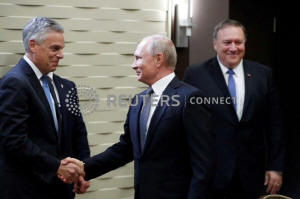Future of last nuclear pact between Russia and U.S. uncertain: U.S.
envoy
 Send a link to a friend
Send a link to a friend
 [August 15, 2019]
By Andrew Osborn [August 15, 2019]
By Andrew Osborn
MOSCOW (Reuters) - The last major nuclear
arms control treaty between Russia and the United States is outdated and
flawed, the U.S. ambassador to Moscow said on Wednesday, saying it could
be scrapped altogether when it expires in 2021 and replaced with
something else.
The New START treaty limits the number of strategic nuclear warheads the
world's two biggest nuclear powers can deploy to no more than 1,550, the
lowest level in decades. It also curbs the number of nuclear launchers
and deployed land- and submarine-based missiles and nuclear-capable
bombers they can have.
"Some want to extend New START. Some are arguing in favor of creating
something new. I’m not sure where it will go," U.S. Ambassador to Russia
Jon Huntsman told the Ekho Moskvy radio station on Wednesday.

The treaty's future is in focus after the United States withdrew from
another landmark nuclear missile pact with Russia this month after
determining that Moscow was violating that treaty, an accusation the
Kremlin denied.
President Donald Trump, who told President Vladimir Putin in 2017 he
thought it a bad deal for the United States, will only decide next year
whether or not to extend the surviving New START treaty, U.S. officials
have said. It was signed by his predecessor Barack Obama with Russia in
2010.
Regarded by many experts as the only thing preventing an unfettered arms
race between the two Cold War rivals, the treaty can be extended for
another five years, beyond its expiry date in February 2021, by mutual
agreement.
'OPEN QUESTIONS'
Huntsman said the treaty had been agreed at a time that predated cyber
warfare, hypersonic missiles, underwater nuclear platforms and torpedoes
and what he said was China's strategic nuclear build-up.
It did not cover tactical nuclear weapons either and perhaps there was a
case to include non-nuclear weapons in any new update, said Huntsman.
[to top of second column]
|

Russian President Vladimir Putin shakes hands with U.S. Ambassador
to Russia Jon Huntsman, left, as U.S. Secretary of State Mike Pompeo
stands behind prior to their talks in the Black Sea resort city of
Sochi, Russia, May 14, 2019. Pavel Golovkin/Pool via REUTERS/File
Photo

"So there are a lot of open questions. There will be discussions and
agreements and disagreements about the vehicle to use – should it be
an extension of New START, should it be something altogether new?"
he said, saying Trump favored an arrangement that would bring things
into the modern era.
Putin has said Moscow is ready to extend the pact, but has
complained about what he sees as Washington's lack of interest.
In June, after describing the nuclear threat as a "fiery serpent"
that needed to be kept under control, Putin lamented what he said
was a U.S. refusal to engage properly on the subject.
"If no one is interested in renewing (the treaty)... we will not
renew it," said Putin.
On Tuesday, the Kremlin boasted that it was winning the race to
develop new cutting-edge nuclear weapons despite a mysterious rocket
accident last week in northern Russia that killed at least five
people and caused a brief spike in radiation levels.
Moscow is developing a nuclear-powered cruse missile that it says
will have an "unlimited range" and be able to overcome any defenses.
(Editing by Gareth Jones)
[© 2019 Thomson Reuters. All rights
reserved.]
Copyright 2019 Reuters. All rights reserved. This material may not be published,
broadcast, rewritten or redistributed.
Thompson Reuters is solely responsible for this content.

|